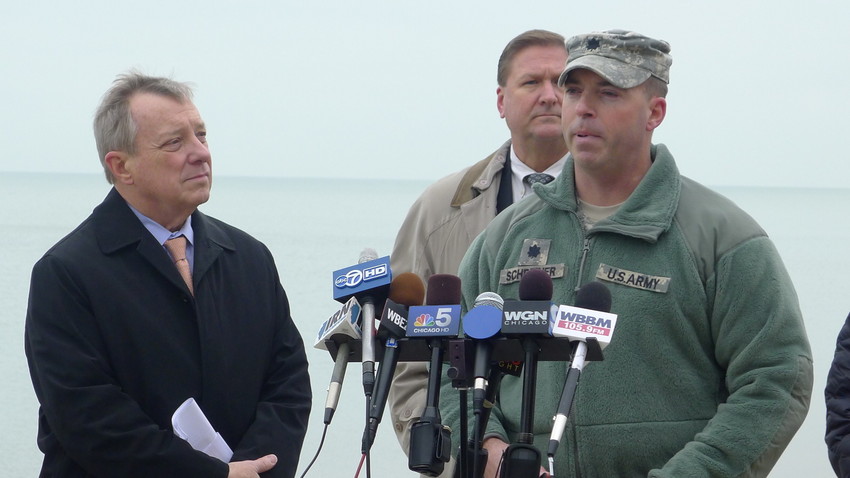Drought could lead Chicago River to reverse course (again)
By Lewis Wallace

Drought could lead Chicago River to reverse course (again)
By Lewis Wallace
Given the run-around
In the year 1900, the city’s civil engineers reversed the flow of the Chicago River, sending Lake Michigan water towards the Mississippi in a famously gutsy feat of engineering. As the city and its industries grew rapidly through the late 1800s, the amount of waste and contamination dumped into the river was threatening to make the lakefront unlivable and deprive Chicagoans of safe drinking water.
When the Chicago River flows in its natural direction, “what you have is a great deal of, for lack of a better word, poo, going into the Great Lakes,” said Henry Henderson of the Natural Resources Defense Council.
That’s how we got the Chicago Sanitary and Ship Canal, which served the dual purposes of diverting dirty river water away from the lake, and connecting Lake Michigan – and therefore the entire Great Lakes water basin – to the Mississippi River water system for the first time, opening up the possibility of commercial navigation between the two. Needless to say many to the south weren’t happy with the new arrangement, which Henderson has described as turning Lake Michigan into “the tank that flushes our waste thousands of miles away into the Gulf of Mexico.”
The new connection between the two water systems has also had unforeseen consequences in the form of invasive species, and lately environmentalists and fishing interests to the north have been calling on the Army Corps to permanently close off the link through the Chicago Area Waterway System (CAWS) in order to prevent a full-fledged Asian carp invasion. That would also restore the river to its natural flow, and force Chicago to think differently about its water infrastructure and waste treatment.
Gravity Rules
Waste treatment or not, the river might re-reverse on its own. After a long drought and one of the hottest summers ever, the water in Lake Michigan only has to go down six inches to sit below the level of the Chicago River. At that point, gravity would send the river back to where it came from.
Flowing into Lake Michigan with it: sewage runoff and only partially-treated human waste (among other things). The Chicago River has been somewhat cleaned up in recent years, but not enough to allow an uninterrupted flow back into the city’s main source of drinking water and recreational beaches.
And those suspicious swim advisories you hear about in the summer? The Chicago Park District has warned they will happen more often if the river reverses.
“Anytime you reverse the flow of the Chicago River, you want to monitor and ensure that there’s no major impacts on water quality,” said Lieutenant Colonel Jim Schreiner, Deputy Commander for the Chicago District Corps of Engineers. He said there are occasions when the Army Corps intentionally (re)-reverses the river to control flooding. All of this is manipulated by the Corps’ control over the Chicago Harbor Lock. The Army Corps is tasked both with supporting the massive shipping industry through the waterways and with helping control contamination, in partnership with the Metropolitan Water Reclamation District.
If water levels hit the lowest projections, the Army Corps will regulate lake contamination by closing the locks at Chicago for longer periods. That would limit how often boats and barges pass between the two waterways. According to Lt. Schreiner, over 40-thousand vessels pass through the locks every year in about 11,500 lockages.
This strange scenario will only come to pass if the Army Corps’ lowest possible lake level projections for the winter come true; lake levels are almost always at their yearly low in late winter. If significant rain or snow hits the Michigan-Huron region in January or February, the water will still be unusually low, but it is unlikely to lead to a major change of course.